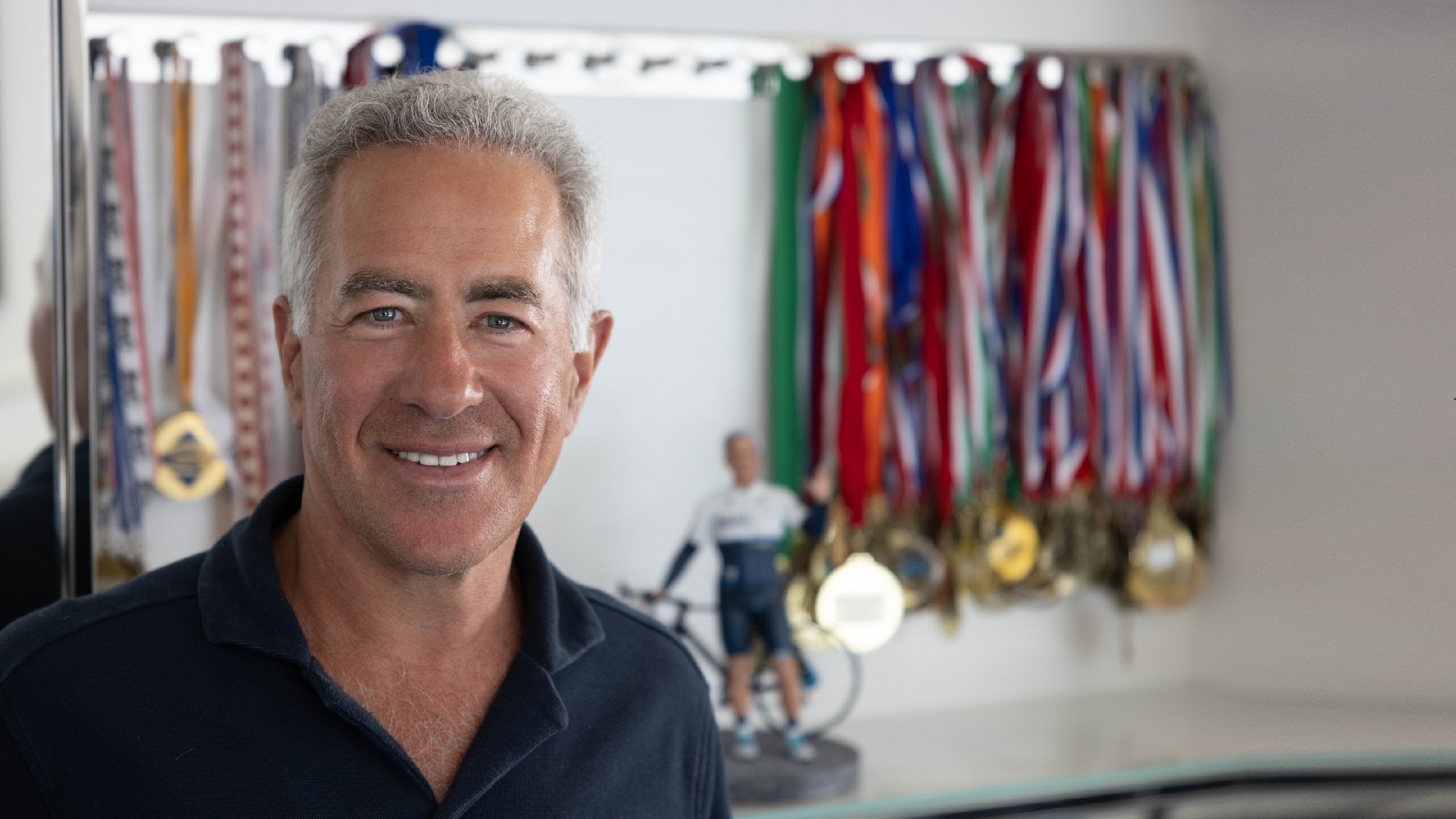Mega Gifter Sylvan Adams Calls Out President Biden’s Double Standard in Israel-Hamas War
Canadian Israeli businessman/philanthropist discussed the war and efforts to unify the nation during difficult times
Dressed in shorts and a white polo shirt, Canadian Israeli businessman and philanthropist Sylvan Adams sits relaxed in his pristine home overlooking the calm Mediterranean Sea, speaking candidly and engagingly with The Media Line’s Felice Friedson about the current crisis in Israel. His critical, pinpoint analysis of Israel’s current political, military, and social challenges contrasts with his casual demeanor.
Adams criticizes US President Joe Biden for quoting Hamas casualty figures and shifting support between Israel and Hamas, which Adams views as incoherent, politically motivated, and undermining of Israel, a key democratic ally. He also expresses his disillusionment with how the war in Israel has been portrayed, describing it as part of a failed system. “Our communications is an absolute catastrophe,” he states.
Born in Quebec City, Adams is the son of Holocaust survivors from Romania. His father, Marcel, escaped a forced labor camp in Bucharest in 1942 and fought in Israel’s War of Independence. His mother, Annie, survived the war in hiding and was interned in Cyprus before immigrating to Canada. Adams grew up hearing his parents’ stories and became a staunch Zionist.
Since moving to Israel in 2016, Adams has dedicated himself to strengthening and promoting the Jewish state’s positive global image, calling himself a “self-appointed ambassador-at-large for Israel.” He aims to show the world what he calls “normal Israel,” countering its often-negative portrayal in the media by revealing the country’s true beauty to large audiences worldwide. Adams has promoted this “normal Israel” and strengthened Israel’s international standing by bringing world-class cultural and sporting events to the country.
Supporters of Israel have, since the October 7 massacre, contributed hundreds of millions of dollars to aid in the mission of destroying the Hamas terrorist group and defending against other enemy forces. Some have focused on future solutions, addressing what has been exposed as inadequate or ineffective. In a significant gesture of support, Adams donated $100 million to Ben Gurion University in Beersheba, redefining traditional philanthropy. Known for his generosity in building sports facilities and supporting educational, technical, and medical organizations, Adams has set new standards in philanthropy.
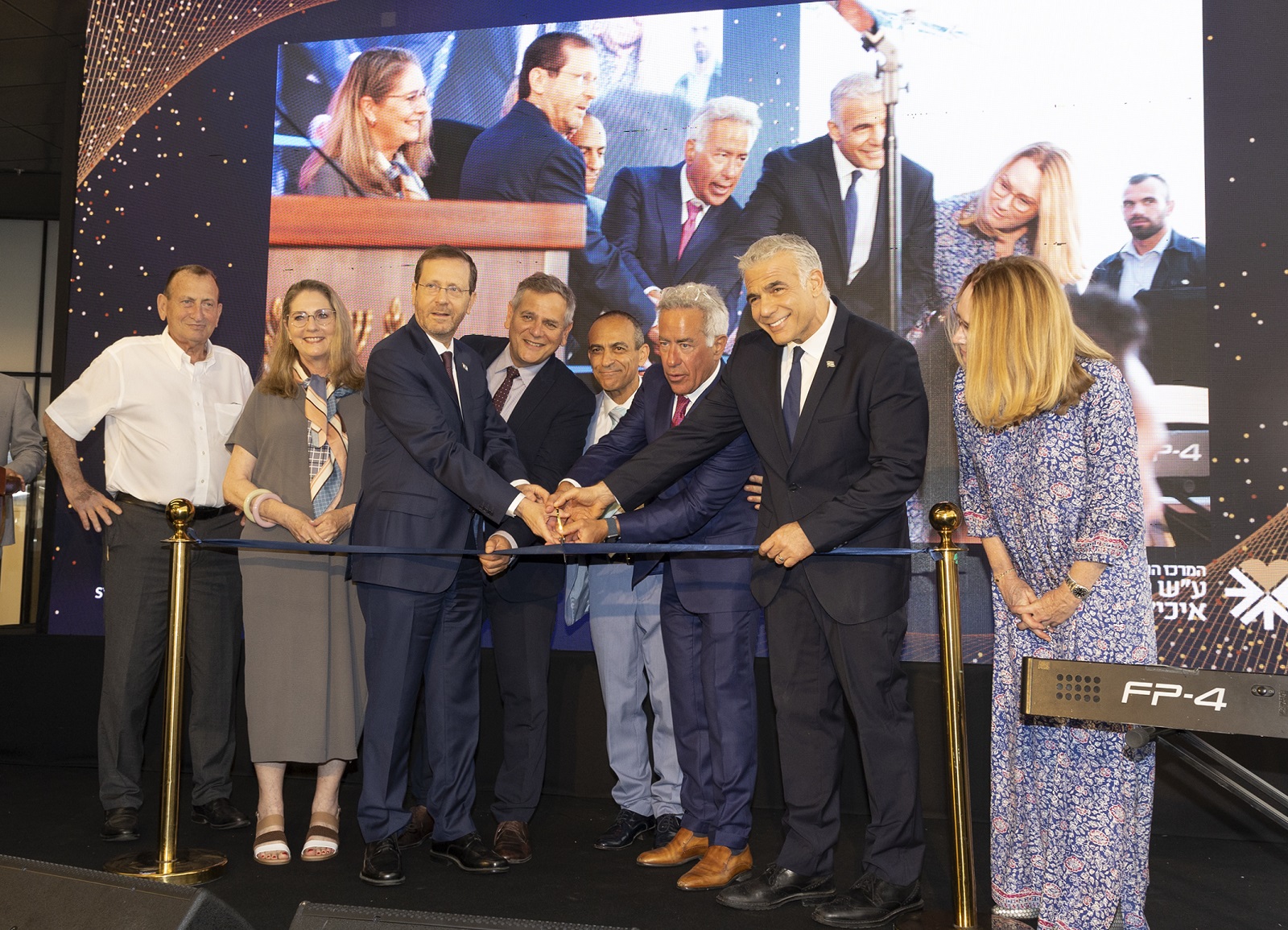
President Isaac Herzog and then-Prime Minister Yair Lapid with Sylvan Adams at the opening of the Sylvan Adams Emergency Hospital at Ichilov Hospital in Tel Aviv. (Jenny Yerushalmi, spokeswoman for Sourasky Medical Center)
Forthright and magnanimous, Adams sees the remarkable attributes of the State of Israel, but also, the deep existential problems facing the Jewish state: “Nobody else is going to help us if we don’t look after our own,” he says.
A full transcript of the interview follows.
The Media Line: If there’s a man that can be credited with building Israel’s world-class sports persona, it’s Canadian-born businessman, sportsman, and philanthropist Sylvan Adams. Sylvan’s choices for adding a sporting dimension to the lives of Israelis has resulted in a myriad of options for his countrymen to plunge into the action or enjoy the spectacle, all brought about according to the generous, and I would suggest unmatched, personal commitment to philanthropy that has benefited so many. And yet, Sylvan, it’s not just sports.
Thank you so much for taking time with me at The Media Line and for giving me an interview to speak about what’s happening during the war and how you see not just what’s happening in terms of Israel at large, but things happening to the Jewish world.
Sylvan Adams: It’s a pleasure to be here with you and I look forward to a very robust conversation because these are subjects for which I have a lot of passion.
The Media Line: Sylvan, why don’t we begin with your first passion, and it is sports, and you were involved in sports and building tremendous things, whether it was through cycling, which was your love of life, or it was taking it to peace efforts and doing things and building from there. Tell me a little bit.
Sylvan Adams: I started with the following idea. Israel has a terrible image abroad for a couple of reasons, one of which is the activities of the haters, and we’ve seen how they’ve operated since October 7, and they’ve been at this for a while, and they are a hostile force. But in addition to that, we have the media that really has been portraying a picture of Israel which is not the Israel that we experience on a daily basis.
The idea with the sports was twofold. On the one hand, to project an image of Israel, what I call normal Israel, as a normal, pluralistic, open, tolerant, western democracy, and something which people perhaps don’t understand, and because sports is something, it’s sports, and also music, cultural events, those are the things that draw the most eyeballs, the most attention around the world. You know, the Olympic Games will be watched, will receive over 4 billion television views.
The Tour de France, you know, I’m involved in cycling, the Tour de France, it’s 2.6 billion people tuning in to the Tour de France. These are enormous audiences. When I hosted the Giro in 2018, what we call the big start, the Grande Partenza of the Giro d’Italia, we had a billion people tune in and see, and it takes place outdoors, a billion people seeing the entirety of Israel through aerial photography, and you know, I know it was working because I measure, one of the metrics that I use is tourism, and we led the world between 2018 when we hosted the Giro and 2019, we led the world in tourism growth. Not only do we have people tuning in via their TV screens, these enormous audiences in the hundreds and hundreds of millions of people, but it breaks the ice and encourages physical tourism, which, again, is of strategic importance to us because we are so misunderstood.
The second thing that happens with these large-scale activities is it brings the people together. Again, I’ll use the Giro as an example. Probably two days before the Giro arrived in Israel, I would say 98% of Israelis had never heard of the Giro d’Italia.
They’re not cycling fans, you know. Israel is a soccer-mad, like many European countries, it’s a soccer-mad country, and yet, knowing that we would be on the world stage, Israelis came together. One million Israelis came into the streets to watch, I mean, 10% of the population came to watch the bike race that they had never heard of because they knew we were on the world stage being seen by very large audiences, and I like to think that those three days where we hosted the Giro was really a national group hug.
We were united, we were all together, and this is the thing, it reaches people emotionally, and that’s how I relate to the people that I call, especially abroad, I call them the silent majority, the people who don’t really know very much about us, but if pressed would probably offer a negative opinion because of the media coverage and because of the activities of the haters.
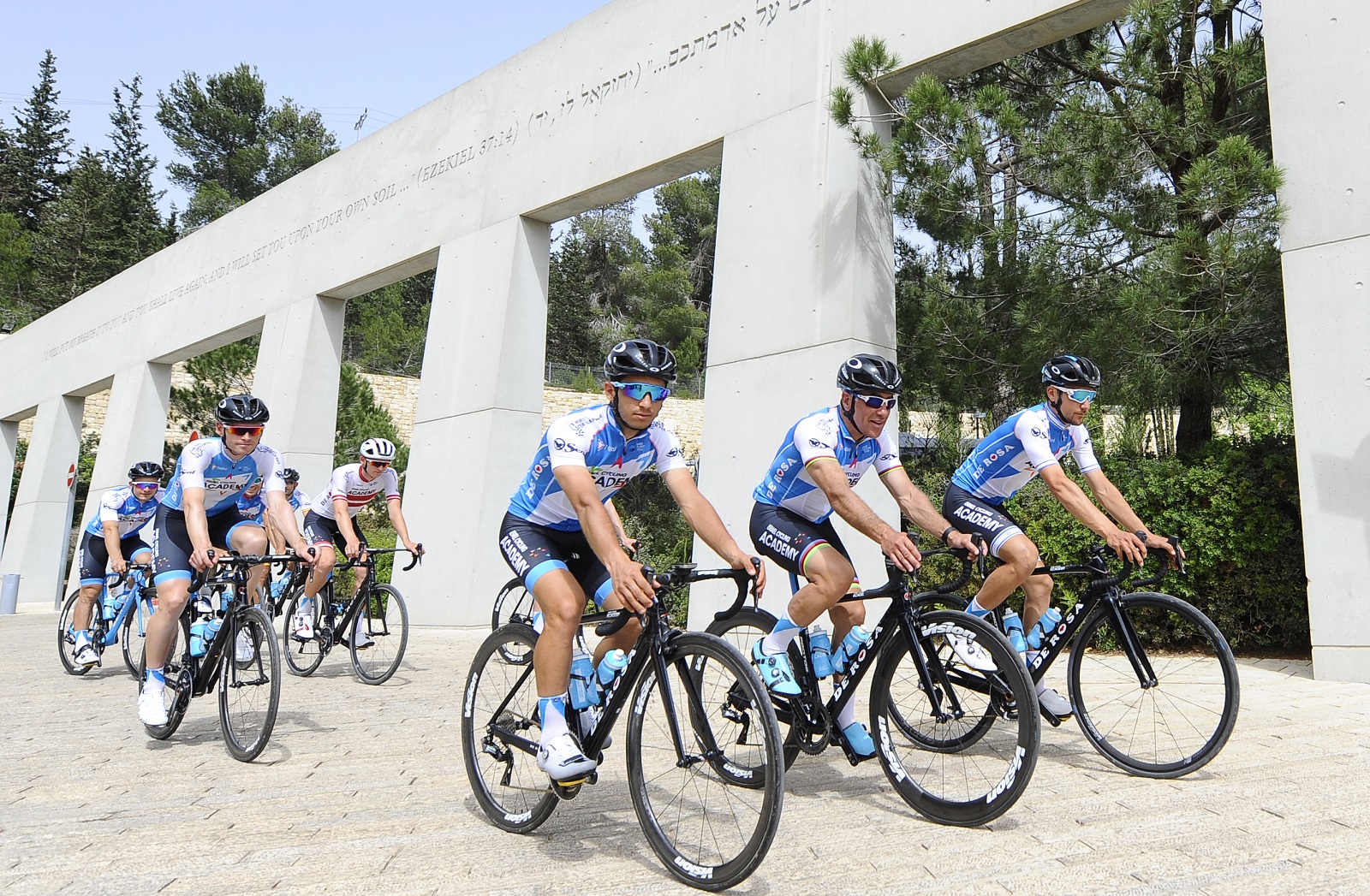
Israel Cycling Academy riders at Yad Vashem. (Noa Arnon)
The Media Line: One case in point was the recent Eurovision, where the popular vote showed that the people were not against Israel.
Sylvan Adams: Right. And by the way, how good was Eden Golan to represent us, a beautiful young woman with an angelic voice, singing a powerful song, and it resonated with people, and this is how we get over the media, over the elites, and directly to the people, that silent majority that I mentioned.
The Media Line: Take the silent majority today, and I want to jump ahead, and we’ll come back to you a little further, but I want to jump ahead to the antisemitism, and the campuses, and the mixed narratives, and the messed up narratives, and you are involved in diplomacy, and working with peace through sports. What do you think is needed today to just change the cacophony of voices that have it all wrong?
Sylvan Adams: I like that you said I’m involved in diplomacy because the week I moved here, I had business cards printed with a title. I call myself the self-appointed ambassador-at-large for Israel, and you’re right, I use sports and cultural events to project this image abroad, and I will add that I had the unique privilege to have been invited to the White House at the signing of the Abraham Accords. I was one of the very few Israelis, remember, it was an American guest list, and I was one of the very few Israelis invited, and the peace negotiators told me that the outreach that I had done was very helpful in creating the conditions, giving confidence to the leaders in the Arab world to take this historic leap.
It is diplomacy, and, you know, it’s diplomacy through sport. I didn’t invent it. We all remember when Nixon went to China, and they said they exchanged ping-pong players, and, you know, this was the icebreaker, and it works because you’re reaching people, as I said before, you’re reaching them emotionally and on a large scale.
The Media Line: October 7 happens. It changes everything with the Abraham Accords. You were involved in trying to put something together between Bahrain and Israel.
Yes. It probably came to a halt.
Sylvan Adams: Yes. It was Bahrain, UAE, and Israel. We were going to host a year-end bicycle race.
Those three countries share a couple of things. We share a geography, which is the Middle East, but each of us also has a professional bike team, and a professional bike team, which is very unusually called after the home country. My team, which is privately owned, I get no assistance from the Israeli government, my brand is Israel.
My team is called Israel. The Bahraini team is called Bahrain, and the UAE team is called the Emirati team. In conjunction with the ownership of those teams, and in their case, it’s members of the royal family, we were going to hold a year-ending bike race.
The governing body of cycling, the UCI, had approved the race, and we were going to host one stage in each of the three countries on a rotating basis, and then hold the year-ending gala of the whole cycling world. And as I told you, these audiences are gigantic audiences, and they would be seeing three Middle Eastern countries cooperating. Of course, we’re at war right now, and all of those activities that I was doing before, they’ve been stopped.
They’ve been stopped dead in the tracks. There’s no way we’re bringing sporting events. It’s not a time, it’s not appropriate, and also it’s not feasible, it’s not possible to do any kind of large image repair or image projection.
I don’t like to say repair. Image projection, because I think what I’m doing, the activities that I do, actually offers a refreshing, honest portrait of what life is like here in Israel, as I said, which is so misunderstood. These will come back, I don’t know when.
For now, I’m pivoting to other activities in support of our country.
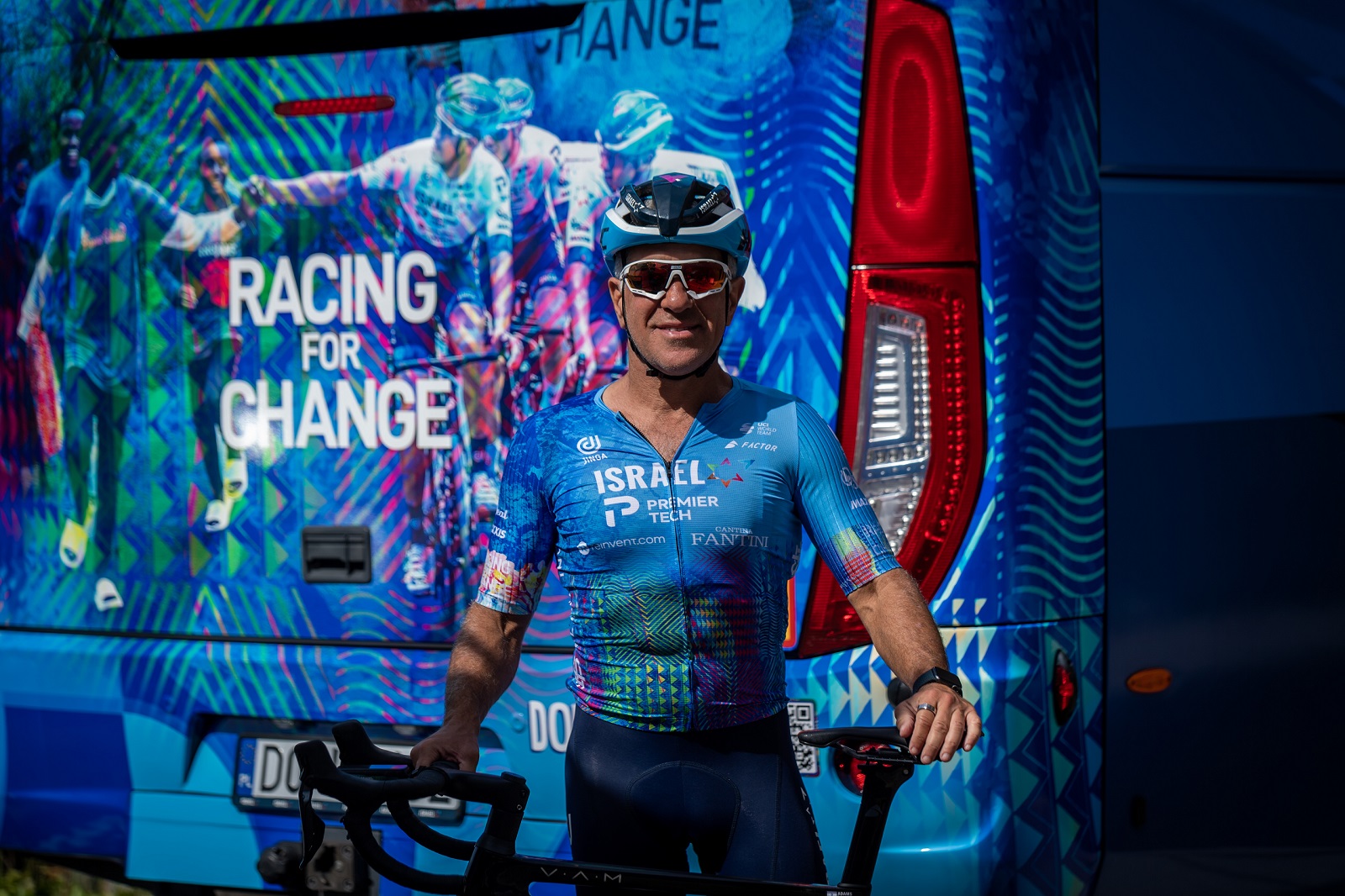
Adams trains with the Israel-Premier Tech cycling team. (Courtesy)
The Media Line: Self-appointed ambassador kind of says it all.
Sylvan Adams: As self-appointed, I can’t be reassigned or fired. I’m on my own, and I’m responsible to the Jewish people.
The Media Line: Well, Sylvan, why should Israel have to be in that position? Where has leadership gone so wrong is really the question.
Sylvan Adams: We’ve seen it with what’s gone on. You mentioned the antisemitism on college campuses and in general around the world. And our enemies, the haters, they’ve been at this for a while.
They’ve been planning this, and we were asleep, all of us. We didn’t understand that they were infiltrating our colleges, they were poisoning the minds of youth, and that they were engaging in a well-funded propaganda exercise which was well-planned and well-funded. And it’s basically funded by Qatar.
They have Al Jazeera. This is a propaganda network. I forced myself to watch Al Jazeera, because we have to know what they’re doing over there.
And it’s hard watching, because it’s pure antisemitic, anti-Israel, anti-Zionist propaganda. And we’ve been asleep. And this was a wake-up call.
The Media Line: Who is the we?
Sylvan Adams: We. Israel and the Jewish people.
In the case of Israel, I think our communications is an absolute catastrophe. We’re engaged in a strategic information war with hostile players, like I said, well-funded hostile players. We’re the startup nation, and we can’t figure this out.
We don’t have good spokespeople. I’ll give you an example. The Orwellian-named Gaza Ministry of Health, Hamas, gives a casualty council, and they told us recently that we’ve killed 36,400 civilians.
They imply that everybody’s a civilian. 36,400. Imagine the precision.
And where are our numbers? It’s silence. The media end up quoting the Gaza Ministry of Health.
Again, people out there in that silent majority who are not politically engaged, they don’t really make that connection. They’re citing these statistics. And we don’t offer any counterbalance.
And we know it’s not true. We know, for example, that approximately half of the casualties have been combatants, are terrorists, basically. Nobody’s sorry to see them leave the earth.
Recently, the United Nations quietly revised their numbers, and they cut them in half. If the United Nations, which is not a friend of Israel, cuts the numbers in half, you can be sure it’s much less than that. Why did we allow, for months and months and months, these terrible statistics to be projected all over, and they stop even using qualifiers at some point?
Joe Biden, at his State of the Nation, he said we killed 36,000 people. And he’s quoting Hamas. How could this be?
It’s because we’re totally inept. I’m sorry to say, we’re totally inept at countering this strategically important information. And we need to do that.
The Media Line: The Biden Administration has had a zigzag policy throughout the war. And I think it’s important to note today, as we’re speaking, the latest statement has been stated by the president that there is no genocide. What do you think?
And again, your background was Canadian, you’re living in Israel, you’re an international businessman, and you see this from a business lens as well. What do you think he’s thinking when one minute he’s backing Israel and the next minute he’s backing Hamas?
Sylvan Adams: First of all, how could you back terrorists against one of your best friends in the world? A friend that suffered a terrible, tragic, unbearably tragic day of torture, rape, desecration, mutilation of our people, the taking of our hostages, including Americans. Americans were killed.
Americans were taken hostage. How could you back a terrorist organization against a democratic ally? It’s completely incoherent.
And of course, it relates to Biden’s election and his own internal party pressures. And but, you know, by catering to a few hundred thousand Muslims, so-called what he thinks are the critical votes in what Alan Dershowitz talks about Joe Biden’s two-state solution, Michigan and Minnesota, the reality is he’s going to lose the election.
It’s worse than immoral. It’s dumb. It’s dumb. It’s bad politics because you’re going to turn off the silent majority.
And they’ve done us a bit of a favor, I have to say, the haters, like by removing the veneer of their antisemitism, this revealing their latent antisemitism that they always held. As I said, we were sleeping. We didn’t see it, but it was there.
October 7 didn’t create antisemitism. It just it just it just revealed the antisemitism was there. Had they concentrated on just being harshly critical of Israel, as I said, the American voter would be torn.
He would be inundated with information. But they turned it into an antisemitic hate fest. And this creates revulsion amongst, as I said, the majority.
Nobody wants to see the American flag taken down and replaced with the Palestinian flag. Nobody wants to see a World War I Heroes Memorial desecrated by pro-Palestinian demonstrators. They are shooting themselves in the foot because they’re turning off the majority.
And I think that Biden hasn’t understood it. Biden and his team haven’t understood that by catering to crazy radicals and by, as you said, toggling between being pro-Israel, pro-Hamas, I mean, you can’t. As I said, it’s both immoral to do so, but it’s also not good politics.
I think this is exactly how you lose the election.
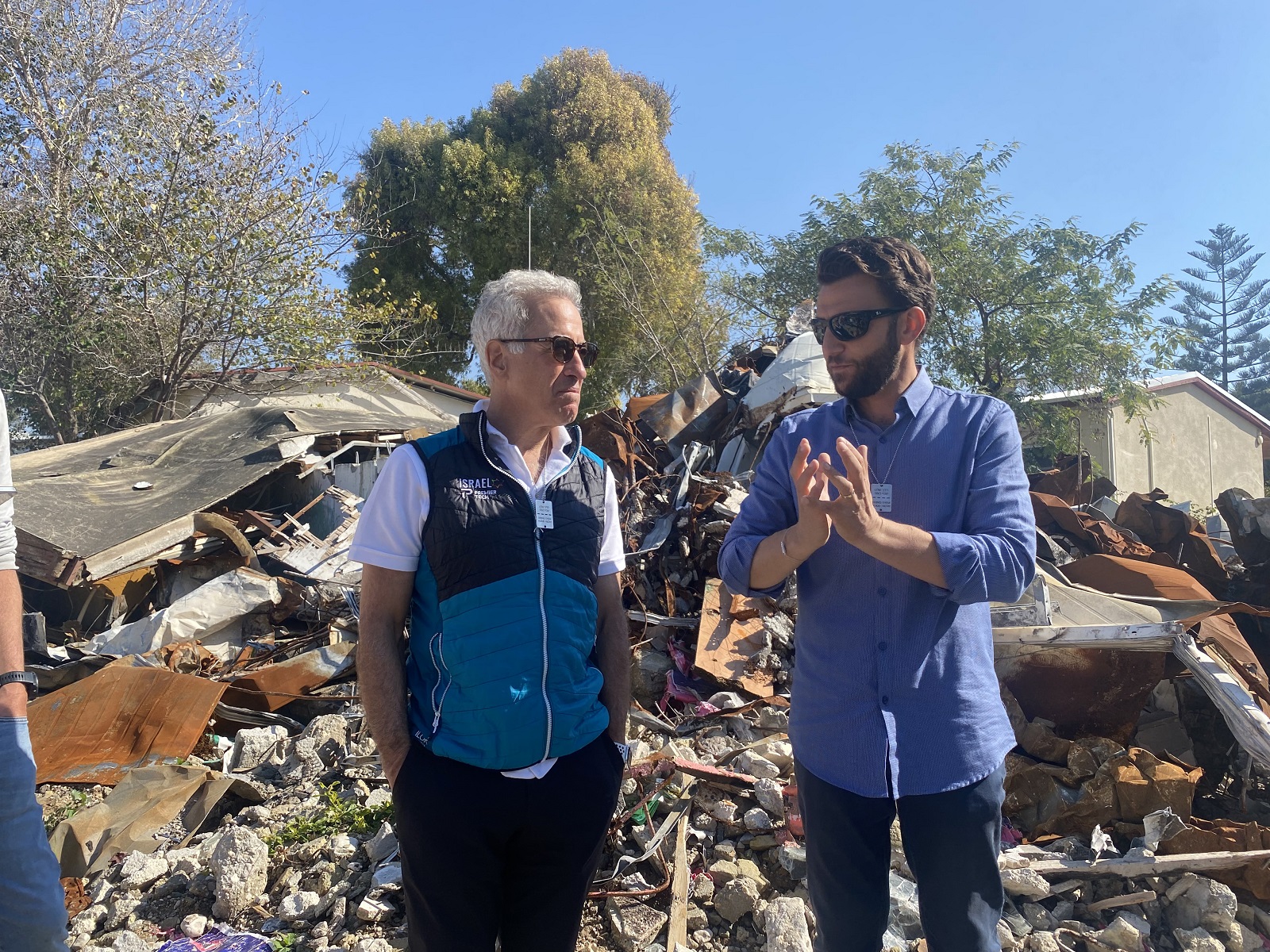
Adams tours Kibbutz Be’eri with resident and October 7 survivor Lotan Pinyan. (Courtesy)
The Media Line: Sylvan, Pandora’s box is open. The ICC has arrest warrants out for the prime minister of Israel and equally at the same time for Hamas leaders, putting them in the same box. Now, what is the impact?
And according to what’s going on right now, what do you think the impact is not just for Israel, but also for projects that you’re doing? Because it’s all related.
Sylvan Adams: It creates a moral equivalency, which is absolutely unacceptable. To compare a terrorist organization that perpetrated a premeditated, you mentioned genocide. It was a genocide.
The Palestinians perpetrated, tried to perpetrate, a genocide against the Jewish people. And again, they don’t distinguish between Israelis and Jews. They hate us.
They hate us. And so by creating this whole double indictment, they put us at the same level.
Can you imagine that, you know, President Obama in Afghanistan, putting President Obama on trial for war casualties? And we’ve conducted the war in Gaza. It’s the most humane urban warfare in the history of warfare.
And this is according to experts such as Richard Kemp, who headed British forces in Afghanistan. And to indict a democratically elected prime minister and his defense minister, it’s just so morally wrong. Again, you could indict every American president using that measuring stick.
They didn’t invite indict Harry Truman when he dropped the bomb on Japan, two bombs on Japan, you know, causing enormous civilian casualties. Israel tries to avoid civilian casualties. In fact, we go to such an extent that we are under fire from hostile forces.
We’re losing our young boys defending Palestinians, creating civilian corridors to bring them to safety so that they’re not in the firing line. Everything about this is wrong. And we are not signatories to the ICC, nor is the United States.
And look, I think I think America needs a change of policy. They’re paying the lion’s share of the bill for that for that kangaroo court. America should pull out of it.
It’s just unacceptable to, as I said, create that moral equivalency we’re dealing with. This is an existential war. For the country.
We’re fighting for our lives. And this is not a game we’re playing. It’s not some game that you know, on a political chessboard.
We’ve lost so many people. We’ve lost 270 soldiers. We lost so many people on October 7 and 8.
We’re playing for our lives. And it’s very harsh to be abandoned by our friends.
The Media Line: People listen to you. If you had a microphone tomorrow and said, I’m the self-appointed ambassador. Yes.
I want to address the world and tell them I have a solution to how we need to end what’s happening, because it’s a multifront war. And Israel really can’t stay at the status quo at this point. Yes.
Sylvan Adams: I think they were very close to a hostage deal. And every time Biden spoke out, always criticizing Israel, Hamas pulled back. In fact, Biden’s speeches have prolonged the agony of our people and have prolonged the war.
We’re on pause. We’ve been on pause for months now. The best way to deal with this is quickly.
And of course, we desperately want our hostages back. And we probably could have we probably could have had them back by now or some of them, perhaps all of them. Had we had we had Biden just laid off and stopped overtly supporting Hamas, they’re toying with us.
They’re the only people who are enjoying Biden’s speeches is Hamas. How could this end? We need to finish it off.
We have no choice. We’ve now blocked the Philadelphi corridor. Crucially important to this to this campaign, because we can’t just you know, the day after the war is over, we can’t just go back to what was happening before where weapons smuggling and all kinds of smuggling is going into Gaza to help them construct a subway system of tunnels under the entire place and weapons factories.
We needed to take control over that border. We need to root out the last four divisions. They estimate around 15,000 remaining of the Hamas fighting force.
And we need to end the war. And this is the way we and I’m all for hostage deals. Let’s bring our people home.
This is our moral imperative. This is the contract that Israel has with its people that we will go to every extent to try to save our people. But our prime minister at the outset said by putting pressure on Hamas, this is how and it worked.
We got the first group out. By putting maximum pressure on the enemy. And so, we need to finish the war, we need to prosecute the war until it’s over.
And the sooner we do that, the better. Then the negative new cycle ends more quickly. Of course, we’re going to face the heat during the final days of the war.
But we can turn the page. We haven’t talked about Lebanon, which is a whole other situation. Now, with the Iranian leader having perished, I think it was two days ago or yesterday, this this buys us a little bit more time to finish the job in Gaza.
But we’re going to have to deal with the northern border. We’ve got 100,000 people who have been forced into, they are the real refugees of this conflict. It’s complicated.
It’s messy. But we’ve got a job to do. And I wish our leaders would get on with it.

Sylvan Adams with his father, Marcel. (Courtesy)
The Media Line: Your love of Israel most likely came from your childhood. Your parents went through the Holocaust, your father went through the Holocaust.
Sylvan Adams: My parents, both my parents lived there in their Romanian, both of them. They met in Canada, by the way, and both had similar journeys to Palestine. My father escaped Romania during the war.
He arrived here in 1944. He fought in the War of Independence and survived slave labor status in Romania. The Romanians joined the Axis powers.
Hitler wasn’t deporting the Jews to concentration camps. The Romanian fascists said, you know, we’ll take care of our Jews. And they basically put them into slave labor.
And really they were starving them to death. Basically, they’re working them and starving them to death. And my father managed to escape and to come to Palestine.
My mother, she spent the war years in hiding in Bucharest, in the capital. And in 1947, they jumped on a boat and they came to British Mandatory Palestine. And like the story of Leon Uris’s exodus, they were diverted, sent to Cyprus to an internment camp in Cyprus for six months until the state was declared and they could return.
Ultimately, both my parents, for different reasons, ended up in Canada and they met there. And so I was born and raised in Canada. But I did grow up, as you said, in a Zionist house where we understood that Israel is a home for every member of the Jewish people.
And there’s no better expression of Zionism than with one’s feet. And so I came home one dark, wintry night after work. And I said to my wife, “Margaret, what do you think about moving to Israel?”
And she gave me she said, “You know what? I always thought we would end up there.” My wife is British.
And we actually met on a kibbutz when we were youngsters in the ‘80s, in the early ‘80s. And she said, “I always thought we would end up there.” And so here we are.
And as I said, it’s the completion of a family journey to be here, to be living in our homeland, and exhibiting the pride in our people.
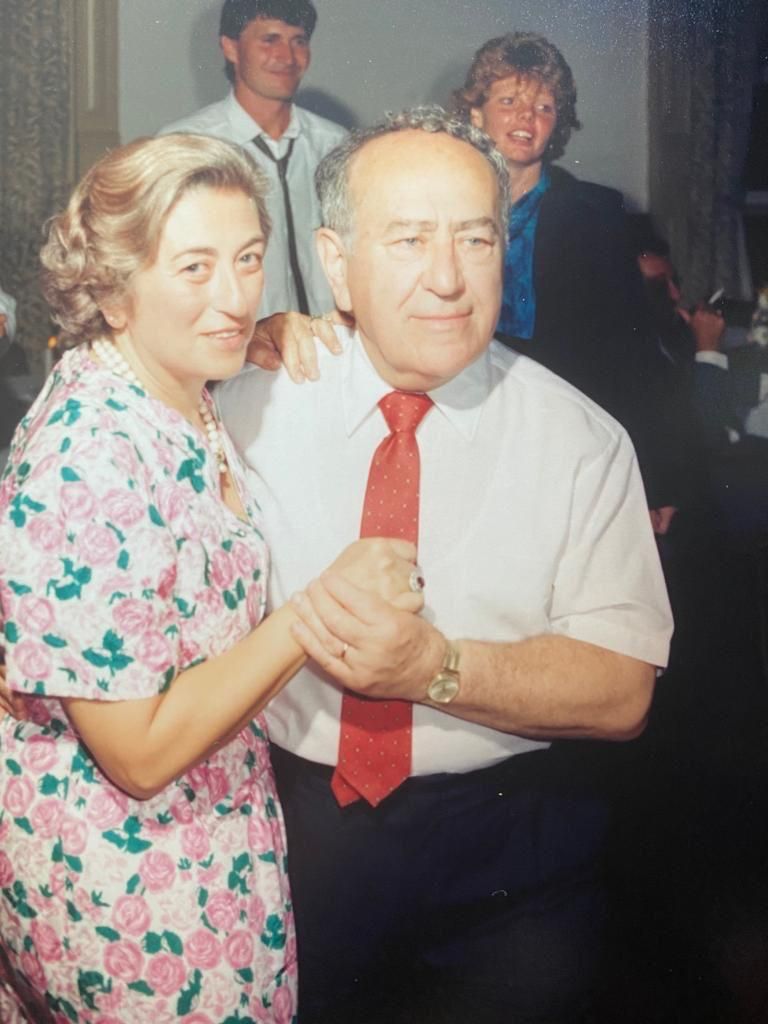
Adams’ parents, Annie and Marcel Adams. (Courtesy)
The Media Line: You have spent years backing this country financially, emotionally, but even during the war, when many didn’t know where to put their dollars, you just placed $100 million with Ben Gurion University. Why did you choose Ben Gurion University?
Sylvan Adams: If we’re going to have people in the South, we need economic activity. Ben Gurion University is the economic engine of our South. And I, it was the largest donation of my life.
And I’ve made many large donations before, but this was much larger. And interestingly, unlike your typical donation of this kind, where usually it’s a project, it’s earmarked, this is actually going into the general operating fund and expansion fund for the university. There are no strings attached.
It’s a generous gift. And I hope that they use it wisely and, and, and continue to support employment in our South. And the idea was, why a hundred million dollars? Cause it’s a wow number.
And in contrast to, we see Jewish donors heavily contributing to the Ivy League schools and it’s in complete contrast to what they’re doing. We need to look after our own.
Nobody else is going to help us if we don’t, if, if we don’t look after our own and, you know, this antisemitism, the infiltration of antisemitic, hostile professors into these institutions with foreign money has been a wake-up call for some of these wealthy Jewish donors. But I don’t understand them to begin with. Where are they here to help their own?
I wanted to make a statement to the entire world that we are here to stay. And, this is the idea behind, and so that, as I said, that was a, and we were, the announcement was made just a couple of months after October 7, you know, in early December. And, again, it was a boost, a morale boost to our people when, at a time when we were suffering so badly to know that we’re here and we’re not going anywhere.
And so we’re telling our enemies, but we’re telling everyone around the world that we are here to stay.
The Media Line: When you wake up in the morning and so much comes at you, what is that one word that resonates in your mind that keeps you going?
Sylvan Adams: I’m an optimistic person. We’ve suffered the worst blow, really, in at least 50 years since the Yom Kippur War, but, but arguably worse because it’s unleashed the ugliness that it’s unleashed, that we’ve seen. And we have many enemies at this time.
And we were quite overconfident in our approach, but I’m an optimistic person and it wouldn’t take that much. Look what happened with the Abraham Accords. When you create the right conditions, it changed the whole picture of the Middle East.
Imagine that we didn’t have the Abraham Accords and you added the hostility of our former enemies into the mix. It wouldn’t take that much. Regime change in Iran, then Hamas will dry up.
They have, without Iran, there is no Hamas, there is no Hezbollah, there’s no, there are no militants in Syria. All of the Houthis will dry up in Yemen. You take away the worst bad actor in the region and the people hate their regime.
It wouldn’t take that much. It would take smart moves by the United States, by an American administration. Unfortunately when they had their green revolution, Obama decided to lay off.
And, you know, the torture and the misery inflicted on their people by the Republican Guard and by the totalitarian regime was really, is unspeakably sad. Israelis and Iranians get along. We had good relations for many, many years.
And I don’t think they’re, the, the Iranian people, Iran is a profoundly important country and a, and a, and an ancient culture. And I don’t think that the Iranian people have anything against Jews or Israel, quite to the contrary. And they hate their own regime.
And so it wouldn’t take that much and the whole world could change. And so, as I said, I’m an optimist. I’m a person who thinks positively.
And you know, let’s perhaps use this crisis as an opportunity to a better place.
The Media Line: Sylvan Adams, thank you so much for this interview and for your insight into life.
Sylvan Adams: Thank you very much. Appreciate it. I enjoyed talking to you.
The Media Line: Thank you.
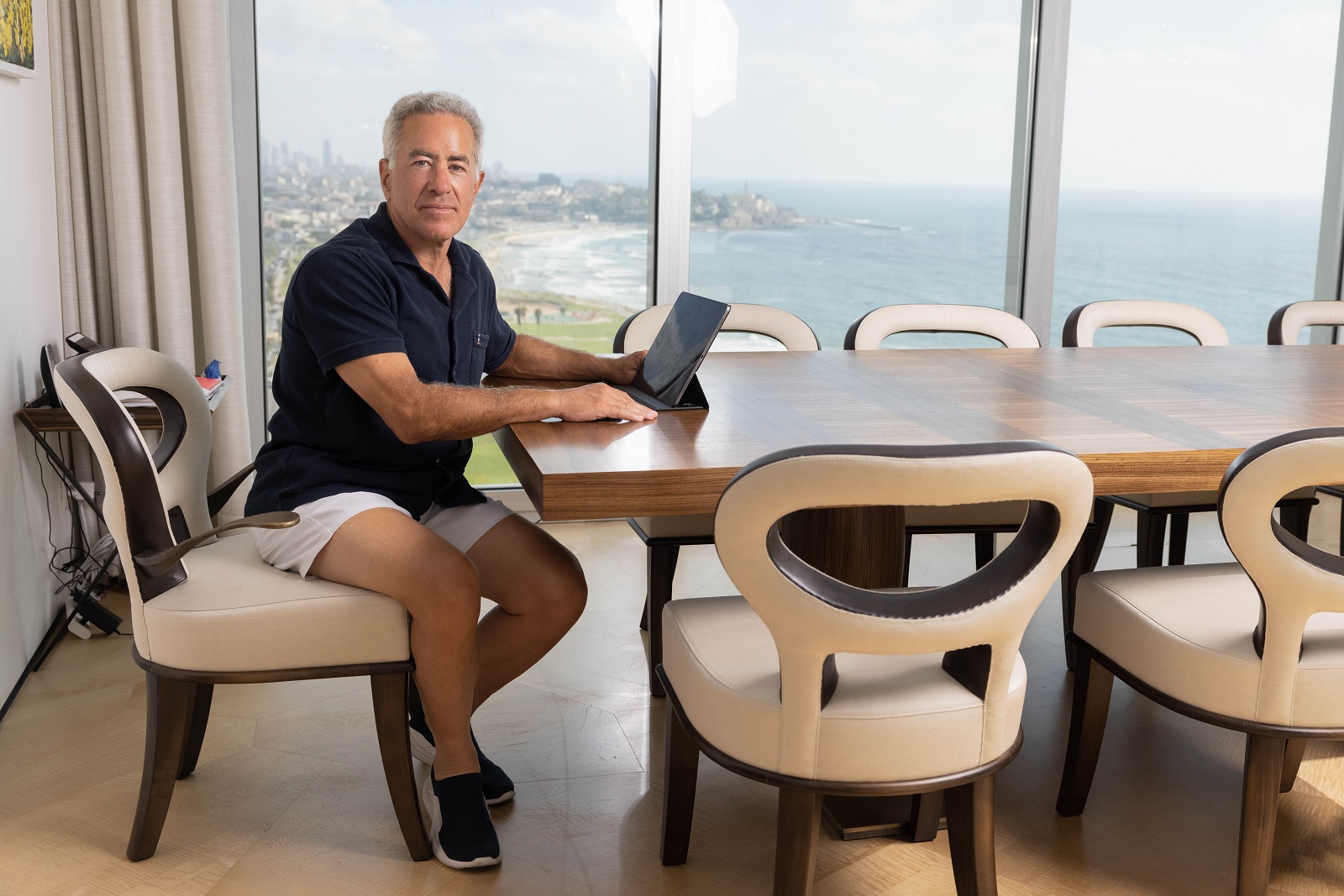
Sylvan Adams at his home in Tel Aviv. (Ziv Koren)
